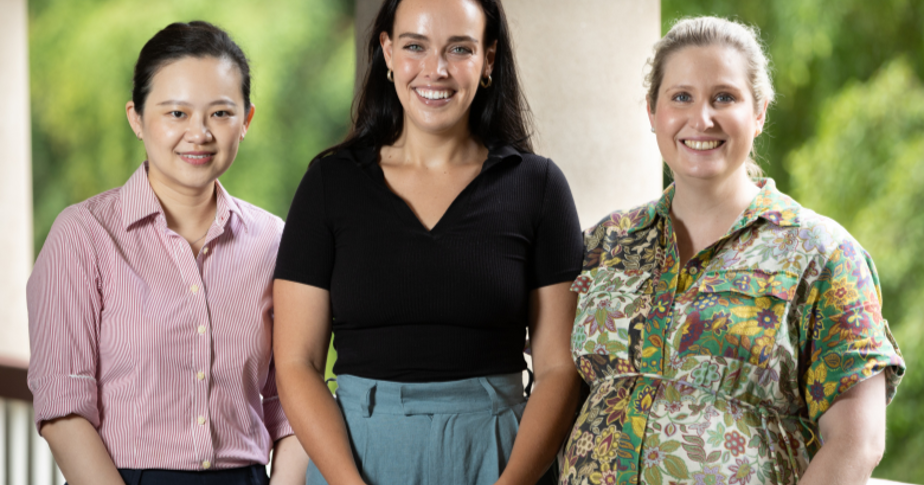
Three doctors—two obstetricians and one medical officer—at the Centre for Maternal Fetal Medicine (MFM) at Mater Mothers’ Hospital have embarked on PhD journeys through Mater Research and The University of Queensland to improve outcomes for vulnerable infants. On International Day of Education, Mater acknowledges their dedication to pursue higher education for the benefit of the broader community.
Supervised by Senior Specialist in Maternal Fetal Medicine Professor Sailesh Kumar, Dr Tegan Triggs, Dr Rosie Stoke and Dr Jesrine Hong are each pursuing PhD studies that will further their own education and produce new knowledge into MFM.
Prof Kumar, who is also Group Leader of Genesis Maternal Fetal Medicine Research at Mater Research, said that the recently established fetal growth clinic within the Centre for Maternal Fetal Medicine is a specialised clinic for women with small and vulnerable infants. Much of the data that Drs Triggs, Stoke and Hong work with is generated from this clinic.
“The Centre for Maternal Fetal Medicine provides expert care for women with complex pregnancies including those with placental abnormalities resulting in small or growth restricted infants,” Prof Kumar said.
Dr Hong, a mother of two, is a MFM fellow in training. Her PhD project is titled, the Pregnancy Outcomes and Placental Biomarkers (PROSPER) study.
“This study aims to ascertain whether placental biomarkers can accurately identify small babies at birth, and those that are at risk of adverse perinatal outcomes,” Dr Hong said.
“Our research team, which includes midwives and sonographers, provide women with careful monitoring and individualised care and advice regarding timing of birth. This is important, as small babies have high rates of mortality, as well as both short and long-term complications”.
Dr Triggs, who is currently expecting her third baby, is an obstetrician and gynaecologist who always wanted to pursue a PhD to further her own education.
“After completing my specialty, I saw major areas that could be improved on in terms of learning how the placenta affects perinatal outcomes, and I was really interested in the work that Prof Kumar and his team were doing,” Dr Triggs said.
Dr Triggs’ research project, Placental Biomarkers for the Prediction of Fetal Growth Restriction, is focusing on babies who have not been growing to their full potential inside the uterus.
“Small babies are more prone to becoming distressed in labor, which means their mothers are more likely to require obstetric interventions. If we can look at ways to predict which babies are at risk of this, we can counsel women and provide them with safer birthing options with less intervention and improved outcomes,” Dr Triggs said.
“In the short time I’ve been doing my PhD, I've developed new perspectives and understanding on how we conduct research, and the best way is to answer questions.”
Dr Stoke recently graduated with a Doctor of Medicine from The University of Queensland and is in the final year of her PhD.
Her research involves studying the causes of “small” baby births and the health risks these small babies have throughout their lives, in an effort to eventually prevent and lessen those risks.
Using a rich, integrated data set that describes the pregnancies, labour and post labour experience of women, Dr Stoke uses complex statistical methods to identify key differences in groups of women with infants who are at risk of adverse outcomes.
“By using this comprehensive list of risk factors, we hope to be able to direct the appropriate care that may reduce these outcomes,” Dr Stoke said.
"I am passionate about maternal and child health globally, and I look forward to a career tying together research, clinical work and public health in this field.
Prof Kumar said that supervising the next generation of doctors is a privilege.
"Research may help address some of the perinatal health problems faced by Australians, and I am committed to mentoring younger clinicians interested in a future academic career. Jesrine, Tegan and Rosie are outstanding clinician researchers, and all have very bright clinical and academic futures ahead of them.”
Over the next three months, we are shining a spotlight on how Mater is Putting Women First, and the specialists and services that support women and their families through all stages of their Mater journey. We asked Dr Hong, Dr Triggs and Dr Stoke how women can put themselves first:
Dr Hong: “Women can improve their outcomes by prioritising their own needs and aspirations. This can be done by determining our goals and going for them! Of course, we should always look after our body and mind and not let negativity affect us.”
Dr Triggs: “To put themselves first, pregnant women should read high-quality information to prepare themselves for pregnancy, birth and beyond. Your antenatal care provider can help give a personalised interpretation of the information that’s out there, and the Mater Mothers’ website has fantastic antenatal care resources.”
Dr Stoke: “I’m putting women first by putting women at the centre of our research.”
Click here to learn more about how Mater is Putting Women First.



